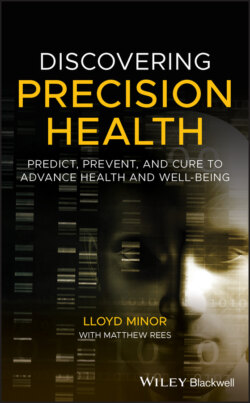Читать книгу Discovering Precision Health - Lloyd Minor - Страница 39
CHAPTER 2 THERE’S MORE TO “HEALTH” THAN HEALTH CARE
ОглавлениеOne of the essential ideas underpinning Precision Health is that medical care plays only a small role in determining our health outcomes. For too long, “health” has been equated with the amount and quality of medical care that’s delivered. Doctors have focused their work primarily on treating disease. That’s how they’ve been trained, how they’ve practiced, and how they’ve thought for as long as the medical profession has existed. The gold standard of medicine has always been to find treatments that work for large numbers of people and match them appropriately to the conditions facing their patients.
But this is an incomplete and flawed approach, in a few different ways. It’s reactive—it focuses on people only after they’re sick. More fundamentally, it doesn’t take account of the factors outside medical care and genetics that drive human health. While every individual is different, the key areas below show approximations of what are typically the key drivers of health outcomes, and the importance of each one relative to the others:
Environmental and social factors: 40 percent
Behavioral factors: 30 percent
Genetics and biology: 20 percent
Clinical care: 10 percent
The relative weighting of these categories is likely to change as our knowledge of human genetics and biology increases and as we can translate this knowledge into more effective approaches to prediction and prevention. As discussed in the vignette at the beginning of the introduction, more‐precise tests that screen for risk factors and enable diagnosis of disease at a much earlier stage are on the way. Although the specific percentages for each area vary among studies [1], the categories are not isolated—they clearly interact with each other. We know, for example, that the environment in which a person lives can have a profound influence on individual behavior. In the United States, for example, obesity [2] and the use of tobacco [3] tend to be more concentrated among people with low incomes. But the universal conclusion from all studies that have addressed this topic is that social, environmental, and behavioral factors are highly significant determinants of health. Recently, Robert M. Kaplan and Arnold Milstein, both of Stanford, reviewed the contributions of medical care to health outcomes, drawing on the conclusions reached in four major studies. They stated, “Healthcare has modest effects on the extension of U.S. life expectancy, while behavioral and social determinants may have larger effects” [4].
There are many reasons why behavioral and social determinants have received far less attention, particularly in the community of academic medicine, compared with genetics and medical care. These reasons include cultural expectations (physicians being identified with the treatment rather than the prevention of disease), perverse incentives in payment systems (reimbursements for care delivered and procedures performed that are not necessarily linked to outcomes), and the sheer complexity of these factors. The net effect has been a relative paucity of studies and actionable changes in social, environmental, and behavioral determinants.
But the future, as I will describe in the pages that follow, offers tremendous opportunities to transform health by moving from reactive medical care to proactive health care. We are living amid a biomedical revolution. Our understanding of the mechanisms of disease is growing in ways that enable us to prevent diseases altogether or diagnose them, and therefore treat them, much earlier and more effectively. New technologies applied to the monitoring of health will play an important role. Finally, the engagement of each of us in our health and well‐being, enabled by the information we have about our health, can be transformative.
